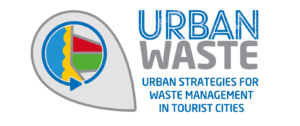Europe’s cities are some of the world’s greatest tourism destinations. The socio-economic impact of tourism is extraordinary in cities, but it brings at the same time a range of negative externalities, including high levels of unsustainable resource consumption and waste production. In comparison with other cities, tourist cities have to face additional challenges related to waste prevention and management due to their geographical and climatic conditions, the seasonality of tourism flow and the specificity of tourism industry and of tourists as waste producers.
URBAN-WASTE will support policy makers in answering these challenges and in developing strategies that aim at reducing the amount of municipal waste production and at further support the re-use, recycle, collection and disposal of waste in tourist cities. While doing so, URBAN-WASTE will adopt and apply the urban metabolism approach to support the switch to a circular model where waste is considered as resource and reintegrated in the urban flow. URBAN-WASTE will perform an analysis leading to a state of art of urban metabolism in 11 pilot urban areas.
Touristic cities
The cities and regions which will support the project and act as pilot cases range from islands and island cities, coastal touristic cities, coastal highly urbanised cities and inland touristic destinations. The cities and regions participating in the project are Florence (IT), Nice (FR), Lisbon (PT), Syracuse (IT), Copenhagen (DK), Kavala (GR), Santander (ES), Nicosia (CY), Ponta Delgada (PT), Dubrovnik – Neretva county (HR), Tenerife (ES).
Learning and action
Parallel to the support, a participatory process involving all the relevant stakeholders will be set up through a mobilization and mutual learning action plan. These inputs will be integrated in the strategies along with a review of the most innovative existing technologies and practices in the field of waste management and prevention. The strategies will then be implemented in the 11 pilot cases and the results will be monitored and disseminated facilitating the transfer and adaptation of the project outcomes in other cases.
A community of local and regional authorities gathered around the exchange of know-how, examples of good practices and other training possibilities

